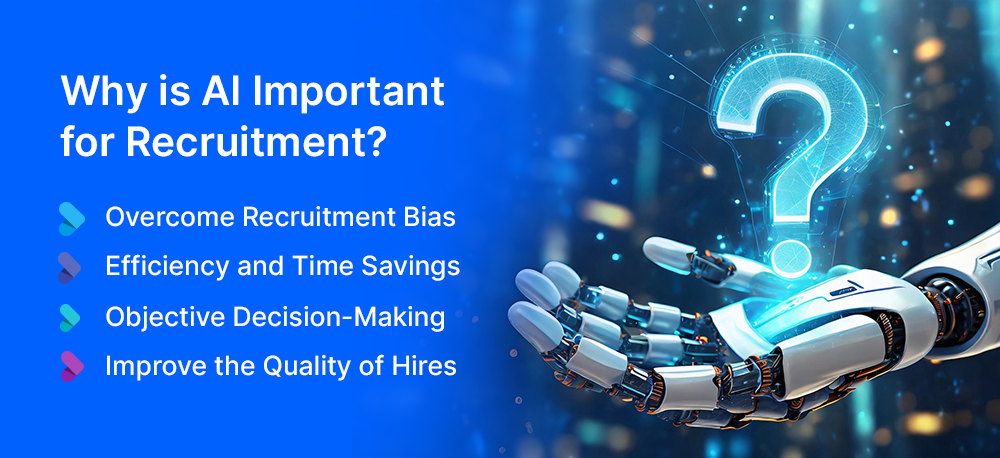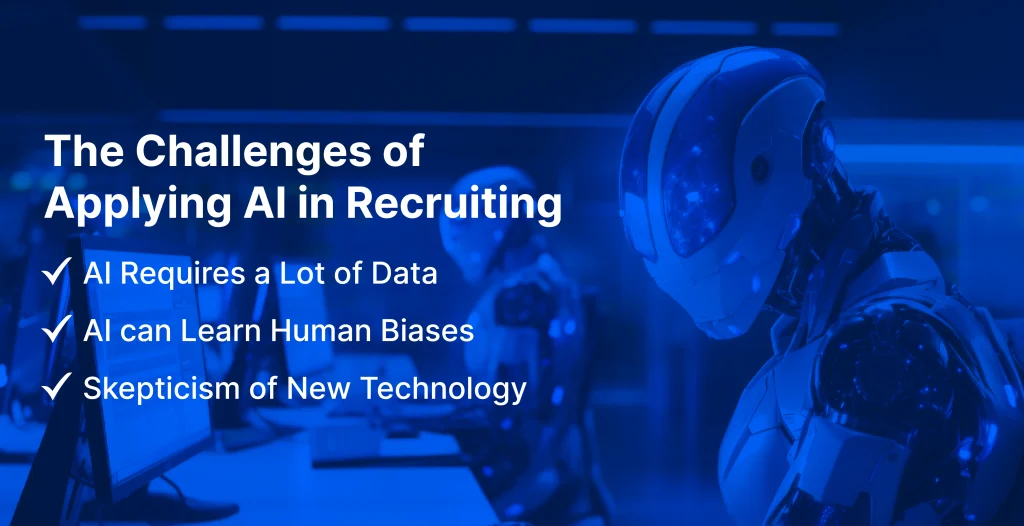The hiring industry is undergoing a change because of artificial intelligence (AI). Therefore, it should come as no surprise that 43% of HR professionals currently use AI in their hiring procedures. Organizations are beginning to see AI’s potential and how it may enhance their recruitment efforts, which is why adoption of the technology is happening so quickly. Moreover, AI recruiting automated candidate screening. It is evident that this change is going to stay given that the worldwide AI market is predicted to reach over $1.8 billion by 2030.
According to Demand Sage: The enterprise sector of AI recruitment will grow at a CAGR of 6.17% between 2023 to 2030.
Hiring is a labor- and resource-intensive procedure that is frequently difficult. Recruiters must handle a variety of responsibilities to identify the best candidate for the company’s needs, from finding and screening prospects to doing interviews and evaluating skills. Hiring managers can now save time and resources by simplifying many of these activities thanks to the advancement of AI. In this post, we’ll look at how artificial intelligence is transforming hiring practices and go over some of the advantages this technology has to offer companies.
Understanding AI in Recruiting
The use of artificial intelligence (AI) technology in the employment process to automate and expedite various components of the process is known as “AI for recruitment.” Recruiters may utilize AI to harness the power of data to improve decision-making. Chatbots streamline AI recruiting processes. AI for recruiting can help with pre-employment evaluations, candidate sourcing and screening, resume and application analysis, candidate success prediction, and cultural fit. Recruitment is commonly a protracted procedure, frequently entailing substantial manual efforts. On average, recruiters dedicate up to 30 hours weekly to administrative tasks like candidate sourcing, resume screening, interview scheduling, and collaboration with other hiring team members. Moreover, AI recruiting tools enhance the hiring process by automating candidate screening, ensuring efficiency and objectivity in talent acquisition.
Recruiters may decrease prejudice, enhance candidate matches, save time and effort, and make data-driven decisions by utilizing AI. Artificial Intelligence (AI) in recruiting can completely transform the hiring process by improving the speed, precision, and efficacy of finding and luring qualified candidates for businesses.
How Does AI Recruiting Process Work?
The AI recruiting process represents a paradigm shift in the talent acquisition landscape, introducing efficiency, objectivity, and unparalleled precision. At its core, AI leverages advanced algorithms and machine learning to streamline the hiring journey.
Initially, AI optimizes candidate sourcing by analyzing resumes and online profiles swiftly, ensuring recruiters have access to a diverse and qualified pool. It goes beyond traditional keyword matching, delving into nuanced aspects such as soft skills, cultural fit, and potential.
Once candidates are identified, AI-driven predictive analytics come into play. By analyzing historical hiring data, these algorithms predict the success potential of candidates for specific roles, aiding recruiters in making well-informed decisions. This data-driven approach minimizes biases, fostering more objective hiring processes.
Throughout the hiring process, AI plays a pivotal role in elevating the candidate and customer experience. AI-powered chatbots engage with applicants in real time, delivering updates and personalized interactions. This not only keeps candidates well-informed but also positively influences the perception of the employer brand.
Furthermore, the impact of AI extends beyond the recruitment phase to encompass onboarding processes. Through the personalization of onboarding experiences, AI facilitates a seamless transition for new hires. This personalized approach not only contributes to immediate satisfaction but also plays a crucial role in fostering long-term employee retention and overall job satisfaction.
Why is AI Important for Recruitment?
AI-driven technology allows recruitment teams to work more productively and concentrate on the wider picture. They have more time to focus on the larger objectives and be strategic. AI in decision-making is revolutionizing recruitment, as it enhances the process of candidate data analysis and ensures that hiring choices are unbiased and more informed. Predictive analytics aids workforce planning in AI recruiting. The incorporation of AI in HR significantly elevates workforce management by harnessing the power of data analytics, enabling HR professionals to make informed decisions and optimize overall organizational performance.
The following justifies the need for recruiters to be current on AI in the hiring process:

♦ Overcome Recruitment Bias
Human prejudices frequently find their way into the hiring process and affect choices in ways that are inconsistent with your company’s aims and beliefs. When choosing candidates, over half of HR managers acknowledge that unconscious bias has an impact. This may lead to poor hiring decisions in addition to being restrictive for companies attempting to develop a diverse workforce. AI has the power to overcome these prejudices and remove subjectivity from the recruiting process when applied properly. Without depending on arbitrary criteria like age, gender, or ethnicity, AI may evaluate applicants objectively based on credentials and experience. In the realm of software development, collaboration among diverse teams is crucial for creating innovative and efficient solutions that meet the ever-evolving needs of users.
♦ Efficiency and Time Savings
Adaptive AI can improve and streamline the recruitment process by automating time-consuming tasks such as resume screening, candidate sourcing, and initial assessments. This efficiency allows recruiters to focus on strategic aspects of hiring, saving both time and resources. AI in HR streamlines employee onboarding processes.
♦ Objective Decision-Making
By leveraging algorithms and predictive analytics, AI contributes to more objective decision-making. It helps minimize unconscious biases, ensuring that candidates are evaluated based on skills, competencies, and qualifications rather than subjective factors.
♦ Improve the Quality of Hires
Workers are a company’s most important asset, and a poor hiring decision can significantly affect output and profitability. According to the US Department of Labor, a bad hire might cost a business 30% of the employee’s first-year pay. Some HR organizations estimate the cost to be higher, between $240,000 and $850,000 per employee. Here’s where artificial intelligence can be useful. AI recruiting tools may evaluate job candidates using data and analytics when combined with conventional techniques, and they can offer managers insights that can help them make wise selections. Artificial intelligence in HR revolutionizes traditional human resource management by introducing advanced technologies that streamline processes, enhance decision-making, and elevate the overall employee experience within organizations.
The Challenges of Applying AI in Recruiting
It’s important to acknowledge the recruitment problems that recruiters and HR professionals now face with traditional hiring methods before delving into how artificial intelligence and recruitment can change the landscape.
Finding the right personnel with the necessary skills and qualifications is difficult due to talent shortages, which continue to be a chronic issue across industries. Additionally, employment processes may be delayed by the time-consuming nature of manual recruitment operations. As a result, businesses lose outstanding employees to rivals. Unconscious prejudices in the employment process present another significant difficulty.

♦ AI Requires a Lot of Data
AI’s effectiveness hinges on the availability of substantial and diverse datasets. Gathering this data necessitates meticulous planning and execution, as well as compliance with data privacy regulations. The challenge lies not only in the quantity but also in the quality of the data. Incomplete or biased datasets can compromise the fairness and accuracy of AI-driven recruitment decisions, emphasizing the need for thorough data curation and ethical considerations.
♦ AI can Learn Human Biases
An inherent challenge with AI in recruiting is its susceptibility to learning human biases present in historical data. If past hiring decisions reflect biases, the AI model may inadvertently perpetuate these biases, leading to discriminatory outcomes. Addressing this challenge requires continuous monitoring, evaluation, and refinement of AI algorithms to ensure fairness and impartiality in the decision-making process.
♦ Skepticism of New Technology
Introducing AI into recruitment processes may face skepticism from both candidates and hiring professionals. The unfamiliarity with AI-driven decision-making can breed distrust. Transparency in how AI is used, clear communication of its benefits, and ongoing education are crucial to overcoming skepticism. Building confidence in AI’s ability to enhance, rather than replace, human judgment is essential for successful integration into the recruitment ecosystem. Machine learning in recruitment leverages advanced algorithms and data analytics to streamline the hiring process, enabling more accurate candidate matching and informed decision-making in talent acquisition.
Future of AI in Recruitment: Trends and Predictions
There are a ton of fascinating opportunities for AI in recruiting in the future. Businesses can completely transform their hiring procedures to attract and retain top talent by utilizing AI-powered solutions. The following are some trends in AI-driven hiring to be aware of:
ATS programs assist in automating applicant interactions, application tracking, and resume screening. The employment process runs more smoothly and effectively thanks to these features.
Chatbots and virtual recruiters as tools for engaging candidates. AI-driven chatbots for recruitment can converse with applicants and respond to their inquiries. Moreover, they can advise applicants on other application-related issues.
AI-enabled face recognition technology in video interviewing platforms allows for the analysis of candidates’ facial expressions and body language. They make it easier to determine whether an applicant is qualified for the position.
AI is capable of analyzing test takers’ responses to online questionnaires. They can also offer insightful information on the abilities and character qualities of individuals. Better recruiting decisions follow from this.
Businesses are using gamification and simulations more often when evaluating candidates. These resources aid in assessing candidates’ inventiveness, flexibility, and problem-solving skills.
Predictive hiring analytics using big data: Recruiters may forecast a candidate’s future job performance by using AI and big data, which allows them to analyze employee and hiring trends from the past.
Conclusion
In conclusion, AI in recruitment isn’t just a technological advancement; it’s a transformative force reshaping the very fabric of talent acquisition. Data security is paramount in AI recruiting platforms. As organizations increasingly embrace AI-driven solutions, the recruitment process becomes not only more efficient but also more strategic, laying the foundation for a workforce that propels businesses into the future. The AI-driven transformation in recruitment is well underway, promising a future where finding the right talent is not just a task but an art perfected by artificial intelligence. AI in the hiring process optimizes candidate sourcing, automates repetitive tasks, reduces bias, and enhances decision-making, ultimately making the recruitment process more efficient and effective. AI development services are playing a pivotal role in revolutionizing the recruitment landscape. Organizations are increasingly turning to these services to harness the power of artificial intelligence in optimizing their hiring processes. AI development services in recruitment encompass the creation and implementation of advanced algorithms and machine learning models. These tools streamline candidate sourcing, automate repetitive tasks, and enhance decision-making, ultimately improving the efficiency and effectiveness of talent acquisition. By leveraging AI in recruitment, organizations can not only expedite the hiring process but also reduce bias, leading to more objective and fair candidate evaluations. The best companies in this field offer tailored solutions that align with the unique needs and goals of their clients, ensuring a seamless integration of AI into the hiring process.
Revolutionize Your Recruitment Strategy With Ai-driven Solutions!
Frequently Asked Questions
AI in recruitment involves the application of artificial intelligence technologies to streamline and optimize different facets of the hiring process. This includes utilizing machine learning algorithms and data analytics to automate mundane tasks, and improve decision-making throughout the recruitment cycle.
AI optimizes candidate sourcing by analyzing vast amounts of data to identify potential candidates based on specific job requirements. It can scan resumes, social media profiles, and other online platforms to match candidates with job criteria, thereby saving time and improving the efficiency of talent acquisition.
AI brings several advantages to recruitment, including faster candidate screening, reduced bias in hiring decisions, improved candidate experience, and enhanced overall efficiency. It also enables recruiters to focus on more strategic and human-centric aspects of the hiring process.
Recruitment platforms powered by AI strictly adhere to rigorous data security standards. Robust measures such as encryption, access controls, and secure data storage practices are put in place to safeguard sensitive candidate information.
No, AI complements human efforts in recruitment. While AI automates routine tasks and helps with data analysis, human judgment, emotional intelligence, and relationship-building skills remain crucial for tasks such as assessing cultural fit, conducting interviews, and making final hiring decisions.
Yes, AI can significantly enhance the candidate experience by providing personalized interactions, timely feedback, and efficient communication. Chatbots and virtual assistants powered by AI can address candidate queries, schedule interviews, and keep candidates informed throughout the hiring process.
While AI automates certain tasks, it is not intended to replace human recruiters. Instead, it allows them to focus on more strategic aspects of recruitment, such as building relationships, understanding organizational culture, and making complex decisions that require human intuition and empathy.


